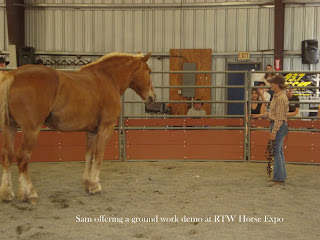If weather still has you limited to the time you spend with your horse, this is a good opportunity to do a clean out/tack check... Too many folks go far too long in between actually checking their equipment and many tack related accidents could have been prevented with basic "maintenance.

Here's the basic checklist I suggest every six months:
Horse Leather Equipment check list-
Stitching- anything frayed, loose or about to come apart?
Holes - have they stretched over time?
Cracks- visible anywhere on the leather
Uneven wear- (especially on saddle seat, also visible on fenders or flaps depending on saddle type)
Stirrup leathers- English saddle leathers tend to stretch and I suggest switching sides they are on every six months
Latigos- especially where they attach to saddle leather tends to crack
Bridles- check where the bit attaches, leather tends to crack there and on chin straps, notice if any buckles/ties/screws are loose/missing, etc. Are all the runners and keepers there to keep tail of leather straps "neat and tidy?"
Reins- do they cracking if you "fold" them tightly at any spot?
Saddle Tree- How often do you look at the underside of your saddle? Have you held the front and rear of your saddle and "pulled" each end towards one another? If there is a "collapse" or "give" in the middle of your saddle seat, your tree is most likely broken.
English saddles- do any knee rolls need re-stuffing or the seat need re-flocking?
Breast plates, cruppers, martingales- no cracks, buckles working, etc.
Other Horse Equipment
Halter/Lead rope- Condition of the snap or attachment end to halter? Anything fraying? Does the halter fit appropriately?
Saddle lifter/riser pad/gel pad/etc- is there uneven wear, does it need to be cleaned?
Girth check- for those using English equipment, is the elastic on your girth unevenly or over stretched?
Rider equipment
Helmet- when was the last time it was replaced, even if you haven't had an accident? Have you dropped it/squished it? Replace it. Are buckles cracked/missing? Does it fit appropriately?
Chinks/Chaps- buckles, straps, etc. all working?
Half chaps- zippers/snaps, elastic in good condition?
Boots- what is the condition of the soles and area around your ankle?
Equipment Cleaning
Everyone has their own preference but I typically lightly clean initial dirt/grim with damp cloth, then use leather soap, then a conditioner to keep moisture in. I use a butter knife for cleaning the grime that accumulates around the buckles.
Leather- Saddles, girths, bridles
Saddle Pads/ Blankets (hypoallergenic dye/perfume free detergent)
Material cinches
Horse Boots (notice if any straps/buckles are missing or cracks in material)
Bits- have you soaked it in clean, non soapy water and cleaned the gunk off lately?
Washing anything synthetic that touches the horse's skin
CLEAN YOUR GROOMING BRUSHES
There's more I could add but this will at least give you a good place to start an assessment and the time to get everything organized for when the riding season starts!
Sam


















